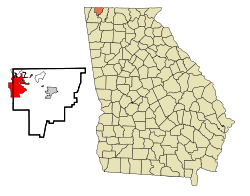Fort Oglethorpe, Georgia
| Fort Oglethorpe, Georgia | |
|---|---|
| City | |

Fort Oglethorpe, GA, viewed from the Chickamauga and Chattanooga National Military Park
|
|
 Location in Catoosa County and the state of Georgia |
|
| Coordinates: 34°56′44″N 85°14′44″W / 34.94556°N 85.24556°WCoordinates: 34°56′44″N 85°14′44″W / 34.94556°N 85.24556°W | |
| Country | United States |
| State | Georgia |
| Counties | Catoosa, Walker |
| Incorporated (city) | 1949 |
| Area | |
| • Total | 13.9 sq mi (36.0 km2) |
| • Land | 13.9 sq mi (36.0 km2) |
| • Water | 0 sq mi (0 km2) |
| Elevation | 732 ft (223 m) |
| Population (2010) | |
| • Total | 9,263 |
| • Density | 667/sq mi (257.4/km2) |
| Time zone | Eastern (EST) (UTC-5) |
| • Summer (DST) | EDT (UTC-4) |
| ZIP code | 30742 |
| Area code(s) | 706/762 |
| FIPS code | 13-30956 |
| GNIS feature ID | 0331756 |
| Website | www |
Fort Oglethorpe is a city predominantly in Catoosa County with some portions in Walker County in the U.S. state of Georgia. As of the 2010 census, the city had a population of 9,263. It is part of the Chattanooga, TN–GA Metropolitan Statistical Area. It is home to Lakeview – Fort Oglethorpe High School.
The United States Army established a cavalry post at the site of Hargrave, Georgia, an unincorporated town situated next to the Chickamauga National Battlefield. The existing settlement was named for an ex-Confederate soldier, William Hamilton Hargrave, who along with his wife Amelia Cecilia Strange-Hargrave owned most of the land in the area. The couple was well known in the 19th century to travellers heading to Ross's Landing on the Tennessee River from LaFayette, Georgia. William Hargrave and other landowners in the area were forced to sell their property to the Army to be used as a base for the 6th Cavalry. The Chickamauga Post established in 1902 by the U.S. Army was later named Fort Oglethorpe after James Oglethorpe, the founder of the Colony of Georgia. During World War I and World War II, the area served as a war-time induction and processing center, and also housed German prisoners of war. Fort Oglethorpe was a major training center for the Women's Army Corps during World War II. The post was declared surplus in 1947 and sold to civilians, forming the nucleus for a city that was incorporated in 1949.
...
Wikipedia
